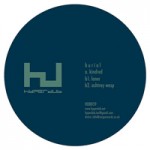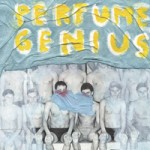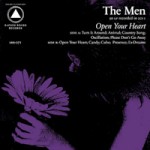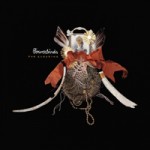Music Reviews, 04/2012
The Shins | Port of Morrow
Label: Columbia / Aural Apothecary
by Joshua Cross
 Long before The Shins were changing Zach Braff’s life and making legions of indie boys believe they might actually stand a chance with Natalie Portman (a dream I refuse to let go, no matter how many choreographers’ babies she births) they were a band of like-minded kids from Albuquerque, NM. Or so conventional wisdom would have it. I’ve never been to Albuquerque, but I’ve been to Santa Fe, and that makes me enough of an expert to dismiss this conventional wisdom as something of a myth. A myth perpetrated by the band and their liner notes, perhaps, but a myth nonetheless. See, The Shins were always James Mercer and a few other guys. The band started as a Mercer side project, and in a way, that’s what they’ve become again. The only difference now is that The Shins are James Mercer and a producer and a few session musicians and, when on the road, a backing band.
Long before The Shins were changing Zach Braff’s life and making legions of indie boys believe they might actually stand a chance with Natalie Portman (a dream I refuse to let go, no matter how many choreographers’ babies she births) they were a band of like-minded kids from Albuquerque, NM. Or so conventional wisdom would have it. I’ve never been to Albuquerque, but I’ve been to Santa Fe, and that makes me enough of an expert to dismiss this conventional wisdom as something of a myth. A myth perpetrated by the band and their liner notes, perhaps, but a myth nonetheless. See, The Shins were always James Mercer and a few other guys. The band started as a Mercer side project, and in a way, that’s what they’ve become again. The only difference now is that The Shins are James Mercer and a producer and a few session musicians and, when on the road, a backing band.
Just as you can’t write about The Shins without recycling some Garden State jokes, you can’t review Port of Morrow without discussing the well-publicized line-up changes since 2007’s Wincing the Night Away. (Seriously. It’s in the Official Rules Manual for Music Reviewers, section 4, rule 7, part 4.02.97c, bylaw A3, addendum zed.) After Wincing, Mercer famously fired every other member of The Shins because, by god, he is The damn Shins. But that’s only part of the story. In reality, Mercer was always the sole songwriter. Still, on their first two albums there was the illusion of this being a legitimate band. Wincing changed this. Compare the liner notes of Chutes too Narrow against those of Wincing. Mercer goes from being credited with vocals, guitar, and harmonica on Chutes to a laundry list of every imaginable instrument on Wincing, signaling that he all but recorded the entire album himself. The band was already being forced out.
Mercer has defended this change in direction by comparing himself to acts like Neutral Milk Hotel and Lilys – stagename pseudo bands for musical auteurs. There’s nothing wrong with taking this approach to recording. In fact, several of my favorite bands are really just one person using a collective name. The key difference is, none of these other acts started off as a full band quite like The Shins did. Neutral Milk Hotel started as Jeff Mangum making tapes in his bedroom. Same with Connor Oberst and Bright Eyes. Lilys, Iron and Wine, The Mountain Goats, Bon Iver, St. Vincent, these are all names synonymous with one individual. Sure, many of them have become something more like a full band over time, but that was a process of addition. For The Shins, going from a band to an individual auteur was a process of subtraction, and you can’t subtract without losing something.
What’s lost in Port of Morrow is the seeming sincerity that made you think, “Yeah, I could totally see Natalie Portman bobbing her pretty little head to this.” Mercer has also lost some of the urgency and immediacy that made songs like “Caring is Creepy” and “So Says I” instant indie anthems. Opening track “The Rifle’s Spiral” comes closest to catching this urgency, and it’s an infectious number, but something’s noticeably different. “Rifle’s Spiral” sounds almost as much like Mercer’s other project, Broken Bells, as it does The Shins. The following track, “Simple Song” comes closest to recreating the sound of the old band, and it’s largely the best song on the album.
But is the point of this album to sound like the rest of the band’s catalogue? We could debate this point all day, and there are legitimate arguments to be made on both sides. For me, there is enough similarity between the sounds on these songs and others like “Bait and Switch” and “September,” and the sounds of previous albums that it’s still recognizably The Shins. But there’s enough different that this feels like a new entity. Ultimately, that’s what this album signals, the beginning of a new era for a familiar band.
Other than lineup, what’s new in this new era? Mercer has always been great at writing a catchy hook-driven pop song, and that tendency is likewise as noticeable on Ports of Morrow. But some of these songs – “It’s Only Life,” “For a Fool,” “Fall of ‘82” – border on Adult Contemporary Top 40. “40 Mark Strasse” is so vanilla I can almost picture Casey Kasem crooning “You gotta hear this one song” from under a pair of giant headphones. These are all catchy pop tunes, but they feel so safe, so familiar, that I can’t help but wonder if becoming a father has made Mercer feel the need to write songs for dads, or if the move to a major label has made him feel pressure to write more commercially successful songs, or if this is just the natural progression of things.
Port of Morrow is by no means a bad album. Its strengths greatly outweigh its flaws, and even the most radio-friendly songs have something interesting about them – when not distracting us with muted trumpets or hand drums. Ultimately, this is a good, if safe, album from one of the most talented pop songwriters to emerge from the indie scene in the past ten years. I just cannot imagine holding it in the same esteem as Oh Inverted World or Chutes Too Narrow. For me, that’s the tragedy of failed expectations even the best band eventually succumbs to.
Lambchop | Mr. M
Label: Merge Records
By Brandon Hobson
 Merge Records calls Lambchop “Nashville’s most fucked-up country band,” and for good reason: their music sounds like anything but country, even stretching the boundaries of what is coined alt-country, an expired term that seemed to hold more validity and interest in the 1990s. I was worried Mr. M might sound too familiar and overdone—how could I think such a thing? Odd as they are, Lambchop has always produced strong, original songs. One of the reasons Kurt Wagner has become such a hero of mine is that he’s always able to write and sing about death and loss in a way that doesn’t sound stale or hokey. Mr. M is a return to their early music, darkly poetic, meditative, and yet it does so much more. As with 1996’s How I Quit Smoking, Mr. M is full of cello and string arrangements, breezy melodies and Wagner’s brilliant lyrics.
Merge Records calls Lambchop “Nashville’s most fucked-up country band,” and for good reason: their music sounds like anything but country, even stretching the boundaries of what is coined alt-country, an expired term that seemed to hold more validity and interest in the 1990s. I was worried Mr. M might sound too familiar and overdone—how could I think such a thing? Odd as they are, Lambchop has always produced strong, original songs. One of the reasons Kurt Wagner has become such a hero of mine is that he’s always able to write and sing about death and loss in a way that doesn’t sound stale or hokey. Mr. M is a return to their early music, darkly poetic, meditative, and yet it does so much more. As with 1996’s How I Quit Smoking, Mr. M is full of cello and string arrangements, breezy melodies and Wagner’s brilliant lyrics.
The album opens with a stoic arrangement of strings, followed by Wagner singing: “Don’t know what the fuck they talk about.” This isn’t supposed to be alarming, of course. Wagner writes with plenty of subtle humor. But other lines feel haunting and real. “The sky opens up like candy,” he sings on the old-fashioned “Nice without Mercy.” Wagner’s poetic language can be as refreshing and calm: “Catching fish with just our hands, and they taste of some cool pastoral splendor.”
As with their other albums, by the end of Mr. M we’re left wanting more. They’ve been around a long time, and it’s not surprising. Despite all their work since the 1990s, Lambchop proves they can still write great songs and push the boundaries of their music. We don’t have to give up on them. We don’t want to. Mr. M is as good as anything they’ve done.
Burial | Kindred
Label: Hyperdub
By James Brubaker
 On 2011’s Street Halo EP, Burial took a gentler approach to the doom-laden, dubstep soundscapes than his listeners were generally used to. The songs on Street Halo were still nervous, jittery, and full of the same post-apocalyptic dread that characterized Burial’s foundational LP Untrue, but the stakes seemed a little lower, a little smaller. That isn’t to say that Street Halo wasn’t a great EP, only that it was a detour down a quieter, sadder back alley. As if in response, on his latest EP, Kindred, Burial returns to bolder, more urgent beats that yank the urban gloomscapes out of the alley and place them firmly back on the eerily lit main streets.
On 2011’s Street Halo EP, Burial took a gentler approach to the doom-laden, dubstep soundscapes than his listeners were generally used to. The songs on Street Halo were still nervous, jittery, and full of the same post-apocalyptic dread that characterized Burial’s foundational LP Untrue, but the stakes seemed a little lower, a little smaller. That isn’t to say that Street Halo wasn’t a great EP, only that it was a detour down a quieter, sadder back alley. As if in response, on his latest EP, Kindred, Burial returns to bolder, more urgent beats that yank the urban gloomscapes out of the alley and place them firmly back on the eerily lit main streets.
While Street Halo was a solid enough outing, the renewed sense of urgency and nervous energy that pervades Kindred is a welcome return to the exciting, dynamic impulses that defined Burial’s sound and helped define an (admittedly troublesome) genre. This return to bolder strokes emerges almost immediately with the opening title track’s introductory beat, a skittery, oddly syncopated bit that leads into the sort of haunted, electro-prayer that would feel totally at home on Untrue. The song starts and stops, the beat drops in and out, the vocals are chopped and pitched—it is everything we love about Burial. Were all of Kindred so familiar, the EP might have been something of a disappointment. Fortunately, the EP’s second and third tracks find Burial pushing against his own form and exploring some new and exciting ground. “Loner” builds around a repetitive melodic riff that wouldn’t sound out of place in most dance clubs (or videogames) then builds and tears down the backing tracks surrounding it. The progression from the familiarity of “Kindred,” to the slightly askew tension of “Loner,” makes for an impressive move and gives the EP a strong sense of motion and growth. This development carries into the EP’s last cut, the dense, paranoid, and lovely “Ashtray Wasp.” Here, Burial moves even closer to conventions of dance music in the song’s pulse and rhythmic drive, while moving further underground in its achingly out-of-focus production. The song’s juxtaposition of a traditional techno pulse with something altogether murkier and more haunted is an extremely effective move that lends the song an outright paranoid and unsettling quality that feels like a new mode for Burial whose work has generally been rooted in a quieter, eerie melancholy.
Of course, Kindred ends in more familiar territory on what is, effectively, a coda, or final movement to “Ashtray Wasp.” After the dense layers and murky anxiety of the song’s body, the EP’s final moments run out on looped pianos and vocals that root us back in Burial’s haunted aesthetic. All the while, static impinges on the elegant outro until the album plays out. There is something about Kindred that makes it feel a little bit bigger, and a little bit more important than Burial’s previous EP. While that EP felt like a quiet rumination for Burial, Kindred feels like a big step forward in an exciting and bold direction. All of the elements that make us love Burial are present in all three of Kindred’s tracks, but by shifting hooks and melodies toward more familiar territory while letting the backgrounds become increasingly unsettled and obscure, Burial is creating new and surprising tensions that not only make this new EP some of his best work to date, but point towards an exciting next step in the artist’s evolution.
Julia Holter | Ekstasis
Label: RVNG International
By Brian Flota
 Julia Holter’s first full song-based studio album, Tragedy (2011), was one of last year’s best unheralded albums. It’s as if Holter arrived fully formed, her quasi-concept album loosely based off Euripedes’ play Hippolytus, gracefully fusing the influences of Laurie Anderson, Kate Bush, Slowdive, and Steve Reich into a heady yet lovely song cycle. If that record gave the appearance of requiring a whole lifetime to realize, then her follow-up, Ekstasis, released some six months later, suffers from the exact opposite problem. Released on RVNG, a label that tends to specialize in experimental live recordings pressed on vinyl in limited editions, Ekstasis is not overly experimental or live. Rather, it seems awfully rushed, like a disconnected gathering of demos for a future project. The opener, “Marienbad,” is both fantastic and thoroughly flawed, reflective of the album’s overall tenor. Holter’s gifts as a composer are on display, but it appears she is trying too hard to prove to her listeners that she is a good musician (which she clearly is). The arrangement is all over the place, resulting in a sort of attention deficit disorder baroque pop (and not of the spastic variety already perfected by Mike Patton). As such, the track, and most of the ones that follow on the album, overstay their welcome to a certain extent. Probably the most troubling of these tracks is the closer, “This is Ekstasis.” The song plods along for about five minutes before really settling into a groove. Why aren’t these first five minutes trimmed? Another sign of this being a rushed product is the appearance of two versions of “Goddess Eyes,” probably the weakest track on Tragedy. The revision doesn’t add anything to the track, and the second variation is the same one from Tragedy. It also becomes clear as one listens to Ekstasis that Holter’s voice, while pretty, isn’t all that strong, as she comes up flat numerous times throughout. Because the compositional structure of Tragedy was so solid, Holter’s vocal misses were hard to notice there. Here, they aren’t. Holter’s previous work through Ekstasis has tended toward the pretentious, including the conceptual Tragedy, a set of field recordings, and chopped-up folk tunes (released under the name Julia Shammas Holter). While Ekstatsis doesn’t suggest that she can’t write good pop-inflected numbers at some point, it does argue that she has a little more work to do. And, clearly, based on her enormous talent (and off-kilter tracks like “Für Felix” and the closing three minutes of “This is Ekstasis”), she can do it.
Julia Holter’s first full song-based studio album, Tragedy (2011), was one of last year’s best unheralded albums. It’s as if Holter arrived fully formed, her quasi-concept album loosely based off Euripedes’ play Hippolytus, gracefully fusing the influences of Laurie Anderson, Kate Bush, Slowdive, and Steve Reich into a heady yet lovely song cycle. If that record gave the appearance of requiring a whole lifetime to realize, then her follow-up, Ekstasis, released some six months later, suffers from the exact opposite problem. Released on RVNG, a label that tends to specialize in experimental live recordings pressed on vinyl in limited editions, Ekstasis is not overly experimental or live. Rather, it seems awfully rushed, like a disconnected gathering of demos for a future project. The opener, “Marienbad,” is both fantastic and thoroughly flawed, reflective of the album’s overall tenor. Holter’s gifts as a composer are on display, but it appears she is trying too hard to prove to her listeners that she is a good musician (which she clearly is). The arrangement is all over the place, resulting in a sort of attention deficit disorder baroque pop (and not of the spastic variety already perfected by Mike Patton). As such, the track, and most of the ones that follow on the album, overstay their welcome to a certain extent. Probably the most troubling of these tracks is the closer, “This is Ekstasis.” The song plods along for about five minutes before really settling into a groove. Why aren’t these first five minutes trimmed? Another sign of this being a rushed product is the appearance of two versions of “Goddess Eyes,” probably the weakest track on Tragedy. The revision doesn’t add anything to the track, and the second variation is the same one from Tragedy. It also becomes clear as one listens to Ekstasis that Holter’s voice, while pretty, isn’t all that strong, as she comes up flat numerous times throughout. Because the compositional structure of Tragedy was so solid, Holter’s vocal misses were hard to notice there. Here, they aren’t. Holter’s previous work through Ekstasis has tended toward the pretentious, including the conceptual Tragedy, a set of field recordings, and chopped-up folk tunes (released under the name Julia Shammas Holter). While Ekstatsis doesn’t suggest that she can’t write good pop-inflected numbers at some point, it does argue that she has a little more work to do. And, clearly, based on her enormous talent (and off-kilter tracks like “Für Felix” and the closing three minutes of “This is Ekstasis”), she can do it.
Perfume Genius | Put Your Back N 2 It
Label: Matador
By Joshua Cross
 Part of what made Joy Division work was the constant conflict between music and lyrics, between melody and melancholy. At times, the music was downright upbeat and almost danceable. Yet no one would mistake Ian Curtis’s voice for sounding happy, and therein lay the tension that made listeners pause. Curtis’s lyrics were so melancholy that the band’s melodies seemed out of place.
Part of what made Joy Division work was the constant conflict between music and lyrics, between melody and melancholy. At times, the music was downright upbeat and almost danceable. Yet no one would mistake Ian Curtis’s voice for sounding happy, and therein lay the tension that made listeners pause. Curtis’s lyrics were so melancholy that the band’s melodies seemed out of place.
No one is likely to mistake Perfume Genius for Joy Division, but what makes Perfume Genius such a powerful act is this same tension between the melodic and the melancholic. Songs like “Dark Parts” or the waltz “Normal Song” sound upbeat melodically, but there’s an agony in Mike Hadreas’s voice that clearly signals these are melancholy songs.
Lyrically, the songs on Put Your Back N 2 It are devastating. Take the opening pleas of “Normal Song”: “Hold my hand / I am afraid / Please pray for me.” That fear radiates throughout the album, as infective as an earworm. What has made Hadreas so afraid becomes clear in other tracks: “17” is a song about self-loathing, “Dark Parts” about sexual abuse. “Take Me Home,” one of the standout tracks on an overall stellar album, is about the need to be loved. The speaker is a prostitute, which complicates this need, and introduces an element of self-flagellation to this basic desire. “I’ll be so quiet for you / Look like a child for you,” he pleads, “Be like a shadow of a shadow / of a shadow for you.” The speaker’s identity is so absorbed in this need to please the other that he feels no longer whole, a shade of a shade of a shade of a nothing that wants to be loved in order to prove he exists.
The album’s lyrical content points to another tension between lyrics and music that makes Put Your Back N 2 It work: A conflict between heavy and light. While Hadreas’s lyrics are heavy to the point of threatening to crush the listener, many of the songs are musically so light and thin they feel like they could snap at any moment. From opening track “AWOL Marine,” to the appropriately named “Dirge,” to the agonized falsetto of “All Waters,” to closer “Sister Song,” many of these tracks are so light that you can hardly understand how they can support such heavy lyrics, while being unable to imagine it any other way.
These dark tensions make Put Your Back N 2 It a remarkable album. But what makes it a great album verging on masterpiece is the small glimpse of hope Hadreas lets through. It’s a simple hope, the hope that this will all get better. One day, it must get better.
The Men | Open Your Heart
Label: Sacred Bones
By James Brubaker
 The Men open their third full length album, Open Your Heart, with a guitar riff that nods toward the opening of Stiff Little Fingers’ “Suspect Device,” then launches into raucous and wild, punk-inflected power pop that sounds kind of like Big Star on a handful of uppers. As an opening statement, “Turn it Around,” says much of what there is to say about Open Your Heart. In the album’s first song, The Men set the tone for an album that is steeped in punk, pop, and psychadelia, with plenty of garage rock swagger to go around. By the time the Johnny Rotten-esque vocals sear their way through “Animal,” the album’s second track, The Men have left little doubt that theirs is a music that intends to be both raw and volatile.
The Men open their third full length album, Open Your Heart, with a guitar riff that nods toward the opening of Stiff Little Fingers’ “Suspect Device,” then launches into raucous and wild, punk-inflected power pop that sounds kind of like Big Star on a handful of uppers. As an opening statement, “Turn it Around,” says much of what there is to say about Open Your Heart. In the album’s first song, The Men set the tone for an album that is steeped in punk, pop, and psychadelia, with plenty of garage rock swagger to go around. By the time the Johnny Rotten-esque vocals sear their way through “Animal,” the album’s second track, The Men have left little doubt that theirs is a music that intends to be both raw and volatile.
Bowerbirds | The Clearing
Label: Dead Oceans
By Joshua Cross
 Like Bon Iver’s For Emma, Forever Ago before it, the story and circumstances surrounding The Clearing, Bowerbirds’ third LP, have greatly overshadowed the music itself. If you’ve seen any press on this album, you probably know all about those circumstances, so I won’t bother repeating them here. Musically, the Bon Iver comparison seems fitting for The Clearing, not merely because the North Carolina duo recorded much of the album in Justin Vernon’s home studio, or because Brian Joseph produced it, or even because the same themes of illness and death and heartbreak that permeated For Emma are present here.
Like Bon Iver’s For Emma, Forever Ago before it, the story and circumstances surrounding The Clearing, Bowerbirds’ third LP, have greatly overshadowed the music itself. If you’ve seen any press on this album, you probably know all about those circumstances, so I won’t bother repeating them here. Musically, the Bon Iver comparison seems fitting for The Clearing, not merely because the North Carolina duo recorded much of the album in Justin Vernon’s home studio, or because Brian Joseph produced it, or even because the same themes of illness and death and heartbreak that permeated For Emma are present here.
What makes this comparison fitting is that, like Vernon did with last year’s Bon Iver, Bowerbirds eschew the whispery DIY backwoods folk of earlier records for a bigger concept with bigger instrumentation and bigger, cleaner production. The most successful tracks on the album benefit from this largesse. “Tuck the Darkness In,” the opening track and clear standout on the album, has an urgency brought to the forefront by the layered instrumentation and furious, almost sloppy execution that comes off as charmingly authentic. Similarly, “Stitch the Hem” benefits from driving percussion and handclaps almost reminiscent of Animal Collective. On tracks like these, the elevated production and more complex instrumentation afford Bowerbirds a deeper means of exploring their themes. Most impressively, these songs manage to sound raw and spontaneous when in reality they’re carefully thought-through and effectively orchestrated meditations.
Unfortunately, not ever song lives up to the standard set by “Tuck the Darkness In.” Songs like “Overcome with Light” sound like earlier Bowerbirds songs. While this might create continuity and cohesion in the band’s catalogue, its placement alongside songs like “Stitch the Hem” suggests a stasis the band is not fully willing to overcome. Meanwhile, missteps like “Hush” fall victim to their production, with the bigger sound feeling forced, unnecessary, and distracting.
Aside from a few standout tracks and a few missteps, the majority of songs on The Clearing are the well-executed rustic Americana we expect from Bowerbirds, solid tunes that drive the listener to neither repulsion nor elation. The band is clearly in transition now, pushing their songwriting in new directions without losing sight of their familiar identity. The album shows signs of growing pains alongside the joys of evolution, which is enough to make this a good record, though not quite a great one.
+++ | EP++
Label: Self-Released
By Darien Trujillo
 Settling back in L.A. after several immense Diamond Eyes generated tours, Deftonesfront man Chino Moreno, has teamed up with longtime friend and Far, guitarist Shaun Lopez to form the group +++(Crosses). The trio also includes producer/audio engineer Chuck Doom, who layers and links the live and electronic phrases of drums, keys, and guitar that paint each track. Lopez eventually joined in on working with Doom to produce the tracks for Crosses, an atmospheric blend of Indietronica with metal influences that recalls a hazy mixture of absinthe and Ecstasy (add in Chino’s dreamy vocal element and Crosses steers toward trance-rock territory).
Settling back in L.A. after several immense Diamond Eyes generated tours, Deftonesfront man Chino Moreno, has teamed up with longtime friend and Far, guitarist Shaun Lopez to form the group +++(Crosses). The trio also includes producer/audio engineer Chuck Doom, who layers and links the live and electronic phrases of drums, keys, and guitar that paint each track. Lopez eventually joined in on working with Doom to produce the tracks for Crosses, an atmospheric blend of Indietronica with metal influences that recalls a hazy mixture of absinthe and Ecstasy (add in Chino’s dreamy vocal element and Crosses steers toward trance-rock territory).
EP++, released just over a month ago, is Crosses’s second extended play, internet release and is available in a deluxe edition, which features five songs, demo seeds, front and back cover art, a digital booklet and in-studio video. Upon listening to EP++, I immediately noticed a conceptual approach (EP+ has a more disconnected demo feel in between tracks). Instrumentally, this concept is realized by the steady minimalist/lo-fi tonality felt from start to finish. EP++’s feel is also branded by its recurring lyrical themes. There is a beginning, an end and a story in between. The first track appropriately titled “Frontier” has a cinematic onset. The speaker, (which seems to be the same character throughout the record) offers the subject benediction for his/her enigmatic ways as they embark on a journey towards enlightenment. Echoed synth notes accompanied by a slow tempo electric drum riff are then smeared by a high treble latent guitar phrase in this premise’s noir intro. In comes Chino’s crooning vocals that build toward a cathartic refrain of heavy guitar and bass. This would adhere to the typical Alt Rock/Rock Ballad formula if Chino’s voice didn’t ascend into an ethereal whale moan supported by Chris Robyn’s (also of Far) heaving acoustic drumbeat that joins creating an elegantly gritty shoegaze ambience. The other four songs keep up this dreamy sythrock style by maintaining similar instrumental arrangements and tempos at around 90 BPM. Lyrically, the songs continue to depict the speaker’s journey, traversing a range of existential circumstances redolent with Christian iconography while always beckoning an elusive “you.” With each song, the listener enters a climactic situation where the subject is given an ultimatum or offered a choice that promises, solace… enlightenment.
This cast of veteran musicians (Chino with the Deftones & Team Sleep, Shaun and Chris with Far and contributing Velvet Revolver/Guns N’ Roses bassist Duff McKagan) knowledgeably maneuvers the studio, choreographing striking indie records in a matter of weeks devoid of the “produced in my bedroom” feel that has become synonymous with electronically influenced music. Both EPs have been one-hundred percent produced by the band at their own pace and without interference from record companies. This independence is important to Chino, who has mentioned that album expectations and marketing generated hype ruined the concept he was aiming for with previous project Team Sleep. For many Deftones fans, Crosses represents a resurgence of Chino’s own creative insights (The electronic basis and mystical themes are also major elements in Team Sleep). Organic and commercial free, the sanctity of Crosses represents a truly artistic expression from all its members and is very much worth cherishing.
